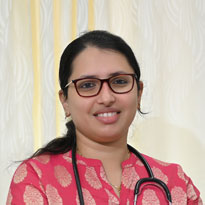Paediatric Neurology is a specialized branch of Paediatric medicine which deals with central, peripheral and autonomic nervous system and its disorders in neonates, infants, children and adolescents. Central nervous system includes brain and spinal cord and peripheral nervous system includes nerves, muscles and neuromuscular junctions. Any disorders affecting the formation and maturation,or secondarily disrupting the normal functioning of the CNS and PNS is included in this speciality.
Congenital &Genetic disorders include a vast number of conditions resulting due to insult sustained at the early developmental phases in utero. It can be due to infections, trauma, radiations, genetic, metabolic, vascular or other causes. These insults result in disruption of the normal developmental process.
Neuro-developmental disorders include children with developmental delay, cerebral palsy, language disorders, intellectual disability, learning disabilities and many similar impairments. The disorders in both these categories present as delay in attaining milestones, poor head growth, seizures, hearing or vision impairment, stiffness or flaccidity or abnormal movements. A long term care and follow up is usually required in these children.Some of the disorders can manifest at birth whereas some disorders may be diagnosed only after a certain age as newer clinical manifestations appear.
Neurobehavioural disorders include autism, attention deficit disorder, social communication disorders and so on. They primarily have an impairment in developing a socially appropriate behaviour patterns. Early identification and behavioral intervention with or without medications is effective in such conditions.
Neuroinfections can be bacterial, viral, fungal, protozoal, tubercular or amoebic. They may have an acute, subacute or chronic presentations and usually present with fever. Timely diagnosis and treatment is of utmost importance in preventing long term morbidity and mortality.
Inflammatory disorders can be primarily affecting the nervous system itself or can be a systemic inflammatory disorder that secondarily affects the nervous system like in systemic lupus erythematosus. Demyelinating disorders ( like multiple sclerosis , acute disseminated encephalomyelitis, transverse myelitis, optic neuritis ) and Autoimmune encephalitis are also included in this category. These inflammatory disorders usually have an excellent response to immunosuppressive therapy. Hence need to be identified early and prompt treatment has to be given.
Vascular disorders like stroke/ vasculitis in Paediatric age group although uncommon is not very rare. Stroke can be due to genetic/metabolic/inflammatory or infectious conditions and children usually respond well to treatment. Plasticity of the developing brain leads to excellent recovery with appropriate rehabilitation therapies.
Neurometabolic disorders and epilepsy generally have an underlying genetic basis and commonly present in the very young age group. They have a wide spectrum presentations ranging from seizures/developmental delay to recurrent/persistent encephalopathy. With genetic diagnosis in such presentations, an appropriate treatment, prenatal diagnosis and intervention, and a follow up plan can be instituted. Similarly movement disorders and ataxia can also be caused by genetic/metabolic conditions or may be secondarily acquired due to inflammation or infections.
Neuromuscular disorders include diseases affecting the muscles, nerve, motor horn cell or the neuromuscular junctions. It can present with weakness , deformities, loss of acquired milestones or as a delay in attaining motor milestones predominantly. An appropriate diagnosis and rehabilitation is needed in caring such children to decrease the morbidity associated with such conditions.
Children with suspected neurological illness (as with the above mentioned conditions) are usually referred by a Paediatrician or a primary care physician to a Paediatric neurologist . Paediatric neurology thus deals with the diagnosis and treatment of all such disorders. Headache, Epilepsy , developmental delay and cerebral palsy form a bulk of Paediatric neurology patients. A detailed history of presenting illness and complete neurological examination is the cornerstone in the diagnosis of any neurological disorder. Once an appropriate history examination is completed, the neurologist categorizes the illness and proceeds with the necessary investigations. Neuroimaging(MRI/CT), neurophysiological testing(EEG, NCS/EMG,sleep studies) or a lumbar puncture are the usual additional tests ordered in a neurological set up. Once diagnosed an appropriate treatment plan is instituted as per the disease diagnosed.Epilepsy will require treatment with antiepileptic medications over a period of time. Developmental delay will require developmental stimulation, physical and occupational therapy and rehabilitation with regular follow up. Children with cerebral palsy have difficulty in maintaining posture and balance and have tonal abnormalities as a result of one time insult sustained during the developing stages of the brain. Cerebral palsy is usually accompanied by many co-morbid conditions like epilepsy, vision and hearing abnormalities, feeding issues and constipation which would individually need attention. A multidisciplinary care is needed in such patients. Rehabilitation and follow up care is of utmost importance as many disorders require a long term care. Recent advances in neurogenetics are promising in diagnosing and treating many neurological disorders providing a glimmer of hope
It is a specialized branch of medicine that deals with the neurological problems in children and adolescents (birth to 18 years)






